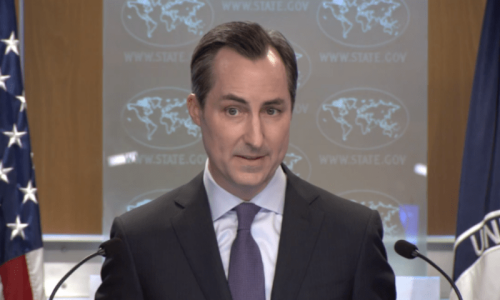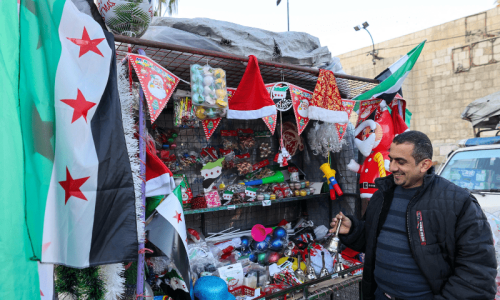KARACHI: It is a chilling scene once one realises what is going on, the real horror coming from the cool and unhurried manner of the killers.
Passengers are forced off a bus by what appear to be militants. As a jihadi anthem blares in the background the militants surround them and force them to sit on the ground. Seconds later they open fire with Kalashnikovs, with the resulting carnage being graphically recorded.
A young boy is then seen clasping his hands and begging for mercy. A militant answers by calmly shooting him dead. Another militant walks around the bodies — slowly and deliberately firing into them, to ensure no one escapes. When it’s all over; the camera lens points to the ground as a militant, seen in the shadow, pumping his fist in delight.
This is a video — now posted on the internet — of the massacre of Hazara Shia pilgrims in Balochistan’s Mastung district last year.
For Pakistan’s government, Balochistan remains the most prominent policy failure. Violence has continued to escalate across the province since the PPP-led coalition took power in 2008.
A battle between nationalist insurgents and the Pakistani state is now a dirty and no-holds-barred war in which hundreds of civilians have been killed.
The latest disturbing trend is the increased targeting of Shias, especially the Hazara community. Over a hundred people belonging to them have been shot dead in the province.
The trend is disturbing as Balochistan has always been among the more tolerant of Pakistan’s provinces and sectarian attacks remained rare until 2001.
All that changed after extremist groups such as Sipah-i-Sahaba Pakistan and Jaish-i-Mohammad were banned by General Pervez Musharraf in 2002. A crackdown by the regime followed, forcing their most dangerous militants and ideologues to move to the tribal region.
http://www.youtube.com/watch?v=jq9idY7nPR8&feature=plcp&context=C42fa836VDvjVQa1PpcFO1cWh4PUma9d0kjxxoVjCeQ08uebBcMK4%3D
Punjabi Taliban
Here they came in contact with Taliban militants; both influenced each other and a new sectarian breed came into being in the form of the Punjabi Taliban, now led by Asmatullah Muavia and loyal to Hakimullah Mehsud.
Initially based in South Waziristan, the Punjabi Taliban were ousted after the military operation in 2009. In reprisal, they carried out high-profile attacks such as the one on GHQ in Rawalpindi. Sources say that that particular incident was the turning point and led to a re-think by the establishment.
Security officials — who wish to remain anonymous — say this was because the GHQ standoff was resolved not just by army commandos but mainly through negotiations by Maulana Mohammad Ahmed Ludhianvi, chief of the SSP, who convinced those inside to surrender.
Army officials dismiss these claims. They say military action broke the siege and that the so-called Punjabi Taliban remains their number one enemy.
It may well be that both stories are true, as one security official points out. Ludhianvi’s intervention — while crucial — was definitely only limited to the GHQ attack. He appears to have little control over the Punjabi Taliban leadership, which continues to wreak all sorts of havoc across Pakistan.
Official protocol
However, it’s also clear that Ahmed Ludhianvi now enjoys official protocol. The SSP and Ahle Sunnat Wal Jamaat, Sipah-i-Sahaba’s current title, are both supposedly proscribed, yet these organisations hold rallies in major cities with ease where arms are openly displayed.
Today it’s clear that the SSP and Lashkar-i-Jhangvi, an even more extreme sectarian outfit, are inter-linked. Maulana Ludhianvi admitted as much to the BBC when he said in an interview that Malik Ishaq, the LJ chief, was released on his guarantees and that the notorious militant now answers to him.
Since Malik Ishaq’s release it’s become easier for the LJ leaders to move around, and they have since started expanding and setting up cells in Balochistan and Gilgit-Baltistan.
These cells are made of locals and have been greatly strengthened, especially in Balochistan — where they operate independently of the LJ central command. There the traditionally secular Baloch — and particularly Brahui — are increasingly turning to the radical Islamist militancy espoused by SSP/LJ.
Security officials — and Shia leaders — say this turn of events is complemented by the growth of sectarian madressahs there. Perhaps the largest Sipah-i-Sahaba seminary outside southern Punjab is in Mastung, in the heart of territory controlled by the Raisani tribe.
Another major reason, according to Shia leaders, is the alleged support by intelligence agencies to groups of pro-government Baloch tribesmen.
Most of these have dual identities — the second being outright sectarian and extremist. It is no surprise, then, that the largest of the groups is considered to be the de facto Lashkar-i-Jhangvi in Balochistan.
All that is perhaps irrelevant for the intelligence agencies, whose main aim is the tried tactic of using religion to suppress nationalism.
Led by a close relative of a senior politician from the province, some of LJ Balochistan’s more high-profile attacks include the killing of Baloch nationalist leader Habib Jalib Baloch and the attacks on the Hazara Shias pilgrims in Mastung.
A senior member of the group accepts it has been involved in attacks to protect the Baloch community – it denies it’s carried out attacks on Shias.
“We are only carrying out defensive actions against people who are supported by foreign intelligence services. The Baloch people are with Pakistan – it’s just that they are scared of the militants.”
He adds that while their group isn’t anti-Shia — the community has elements that act as agents of Iran in Pakistan and they should refrain from this.
Complicity
But Baloch nationalist leaders say a perception is being built up that the Baloch community are targeting the Hazara.
“The Baloch have always been a secular people – it’s the Pashtuns rather than us who have had problems with the Hazaras,” says Nawabzada Jamil Bugti.
“What’s happening is with the complicity of the agencies – everybody knows that the areas where most of the attacks take place – like Mastung – have several FC checkposts nearby.”
“How can the killers escape without their knowledge – or consent?”
While insisting that the Baloch as a whole are not involved in the killings, Nawabzada Bugti acknowledges that some Baloch may be involved.
“The agencies are doing what they did in Bangladesh – where they created groups such as Al Badr and Al Shams.”
“Here it’s the groups like the Baloch Musalla Difa Tanzeem – who regularly target Baloch leaders.”
“If they can kill their own people – what’s to stop them from killings Hazaras on the orders of the agencies?”
Increasingly, it’s LJ Balochistan that has the deadliest militants in the country, men such as Saifullah Kurd and Ramzan Mengal, each responsible for dozens of killings.
Both men added to claims of official complicity when they escaped from maximum-security Anti-Terrorism Force jail in Quetta’s heavily guarded cantonment area. Security officials say they continue to enjoy patronage by some senior Baloch tribal leaders. Hazara leaders in Quetta openly accuse prominent members of provincial Baloch government of allegedly protecting sectarian killers.
But others claim that tribal leaders have no choice; they are increasingly being held hostage to pressure from intelligence agencies and their own increasingly militant Sunni tribesmen. Whatever be the real reason, Balochistan is now being regarded as the biggest, and safest, sanctuary for the country’s fiercest sectarian militants.
The writer is the BBC’s correspondent in Karachi. The views expressed here are his own and not necessarily those of the BBC.












































